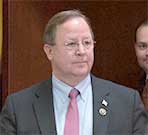|
|
 |
|
The
views expressed
on this page are soley those of the author and do not
necessarily
represent the views of County News Online
|
 |
The Daily Signal
Lawmakers’ New
Project Aims to Support Religious Institutions
Mark McKerrick
October 03, 2016
A new project has been launched to show the need of religious
institutions, which are in danger of losing influence in society as
they face challenges to their existence today.
“We need our faith-based institutions,” Republican Study Committee
Chairman Bill Flores, R-Texas, said at the launch of the America
Without Faith project at the Hillsdale College Kirby Center in
Washington, D.C., in September.
The project, launched by the largest conservative caucus in Congress,
the Republican Study Committee, aims to reinforce the importance of
religious institutions’ role in civil society. These institutions have
a long history in the maintenance of civil society, and have played an
important role in solving problems such as drug addiction, illiteracy,
hunger, homelessness, and supporting families living below the poverty
line.
It was created “to help members of Congress and religious liberty
advocates communicate about how important the work of faith-based
groups are for our nation today,” the RSC said in a press release.
“I think we’ve seen the president [Barack Obama] of the executive
branch try to belittle or embarrass Christians in particular and to say
that we’re ignorant and that therefore we’re discriminatory. … I think
by trying to marginalize us and intimidate us that he’s taken that sort
of mindset and pushed it through the entire government bureaucracy,”
said Flores, who will oversee the project. “It’s up to us as Americans
to try to start rolling that back.”
Since the inception of America, religious institutions have played a
foundational role in the country. They’ve been a boon to preserving a
strong civil society, but now, according to the RSC, they exist on
“shaky ground” as targets of both cultural and governmental forces have
formulated strategies to create friction in their ability to do their
work.
“Over the past decade they have faced repeated challenges to their very
existence, including threats to revoke their tax-exempt status,” says
the RSC.
“There are strong cultural forces afoot that want America to become a
more and more secular nation,” Howard Husock of the Manhattan Institute
said at the Hillsdale College event. They pose a “risk of politicizing
philanthropy,” Husock warned, adding, “America is the most generous and
charitable country on earth, but our public policies could put an end
to that.”
Flores, a supporter of Yellowstone Academy, a nonprofit faith-based
institution with 350 students in Houston, Texas, talked about the
difference in success rates between the federal government and
religious-based institutions.
According to Flores, less than 20 percent of students graduate from
public high schools in that part of Houston. However, “the first class
of students that came in as 4 year olds at Yellowstone just graduated
from high school in May with a 98 percent graduation rate,” he said.
“No federal bureaucrat can make that happen,” Flores added. “No federal
bureaucrat can institute that sort of change in a community that’s been
struggling for decades.”
A strong correlation exists between religious practice and a vibrant
civil society, because “religious practice promotes the well-being of
individuals, families, and the community,” wrote Patrick F. Fagan, a
senior fellow and director of the Center for Research on Marriage and
Religion at the Family Research Council.
“Regular attendance at religious services is linked to healthy, stable
family life, strong marriages, and well-behaved children,” Fagan, a
former senior fellow at The Heritage Foundation, added. “The practice
of religion also leads to a reduction in the incidence of domestic
abuse, crime, substance abuse, and addiction.”
“Why punish the organizations that are serving their communities,
providing free social services, and helping our economy?” Alison
Howard, director of alliance relations at Alliance Defending Freedom, a
Christian legal aid group, said in a statement provided to The Daily
Signal.
“Religious institutions should be free to live out their mission in
society without threat of punishment by the government and the
political elite,” she added.
Gridlock in Washington, Flores said, makes it impossible to introduce
new legislation to stop these forces from eroding the influence of
faith-based institutions. Although, for him, all hope is not lost.
“The best way to have this happen is for this message to get out to
real world America, to the grassroots of America, and everybody says
‘Aha, we have got too close to that tipping point, it’s time to start
pulling back,” Flores concluded, highlighting the urgency of the
problem.
Read this and other articles at The Daily Signal
|
|
|
|

